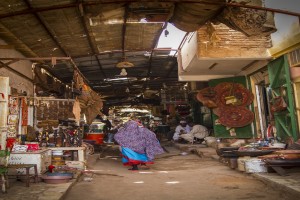
A street in old Khartoum
UN High Commissioner for Human Rights condemns killings of peaceful protesters in Sudan
Khartoum/Geneva: Security forces have killed at least 39 people in Sudan since the October 25, 2021 military coup. At least 15 of the deceased were reportedly shot dead on November 17 alone during protests in Khartoum, Khartoum-Bahri and Omdurman.
The UN Human Rights quoted reliable medical sources saying more than 100 people were wounded during protests yesterday – 80 of whom sustained gunshot injuries to their upper bodies and heads. There was also heavy use of teargas. Arrest operations were reported to have taken place already before, as well as during and after the demonstrations. Police issued a statement stating that 89 police officers had also been injured.
“Following our repeated appeals to the military and security authorities to refrain from the use of unnecessary and disproportionate force against demonstrators, it is utterly shameful that live ammunition was again used yesterday against protesters,” UN High Commissioner for Human Rights Michelle Bachelet said in Geneva today.
Also read: Ahead of protests, OHCHR warns Sudan rulers against using force
Condemning the killing by the security forces, she said, “Shooting into large crowds of unarmed demonstrators, leaving dozens dead and many more injured, is deplorable, clearly aimed at stifling the expression of public dissent, and amounts to gross violations of international human rights law.”
From around 1200 hours yesterday local time, the military authority imposed a total shutdown of phone and mobile communications across the country, in addition to the continued shutdown of the internet services, effectively cutting off Sudan from the world. Only satellite links continued to function.
“A communication shutdown means people are unable to call for ambulances to treat injured protesters, families are unable to check on the safety of their loved ones, and hospitals are unable to reach doctors as emergency rooms filled up, to name just a few very real and serious consequences,” the High Commissioner said. “Blanket Internet and telecommunications shutdowns violate core principles of necessity and proportionality and contravene international law,” she added.
Since the military coup, journalists, particularly those perceived to be critical of the authorities, have been targeted. Journalists have been arbitrarily arrested, attacked while reporting, and had their homes and offices raided by security forces. There is also disturbing information of attempted abduction of journalists by armed assailants in plain clothes.
“With the Internet shutdowns, the role of journalists in getting essential information out on the current situation is particularly crucial, but I fear the increasingly hostile environment against them may lead to self-censorship, and further threaten media pluralism and independence,” the High Commissioner said.
“I urge the authorities to immediately release all those who have been detained for exercising their rights to freedom of expression and peaceful assembly, as well as all detained political actors – as they have publicly pledged to do.”
Bachelet stressed that members of the security forces as well as political and military leaders responsible for unnecessary and disproportionate use of force against protesters must be held accountable in line with international human rights law and standards. The High Commissioner also stressed the need to ensure that healthcare workers are not targeted for providing medical care to injured protesters, and their essential work is not hampered.
– global bihari bureau





